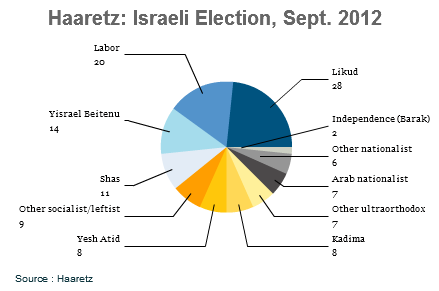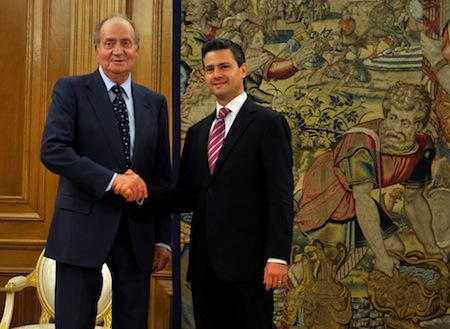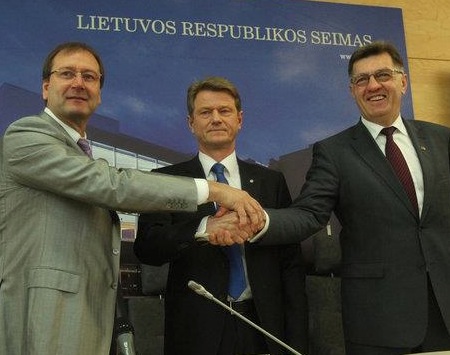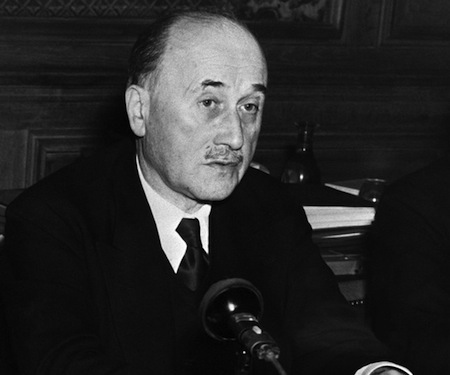
Israeli prime minister Benjamin Netanyahu yesterday announced that he would call early elections for Israel’s unicameral legislature, the Knesset: 
In a televised statement, Netanyahu said that, as his coalition government would not be able to agree on a national budget for 2013, he had “decided, for the benefit of Israel, to hold elections now and as quickly as possible.”
The elections would take place within three months, the prime minister said.
“In a few months, the tenure of the most stable government in decades will come to an end,” Netanyahu said. “This stability has helped us achieve the two main objectives we promised the citizens of Israel – to strengthen security at a time when a dangerous upheaval is gripping the Middle East, and [to fortify] the economy during…a financial turmoil.”
In calling for elections “as soon as possible,” which can be held a minimum of three months after the dismissal of the Knesset, Netanyahu appeared to be targeting as soon as January 15 , but the election could be held in February as well. The Knesset is expected to be dismissed as soon as possible, ostensibly over the budget, but really as much because Netanyahu believes he’s in as good a position as he’ll be between now and October 2013, the last possible date elections could be held.
So where does the race stand today?
Nearly everyone expects today that Netanyahu’s conservative Likud (הַלִּכּוּד) party will win the greatest number of seats in the upcoming election and thereupon form a coalition (with any number of parties from the left, center or right and from both the secular and religious parties), extending Netanyahu’s grip on Israeli power at a time when the possibility of a nuclear-armed Iran in the future seems more likely than not.
Speaking of Iran, the race could well feature Iran and U.S.-Israeli relations as a top issue. In any event, the Israeli election will follow the U.S. presidential election. Netanyahu has recently been making an incredibly high-profile case for U.S. president Barack Obama to set ‘red lines’ over Iran’s nuclear program — ‘red lines’ that, if crossed, would trigger a military response from the United States and/or Israel. Although Obama’s challenger in the U.S. race, Republican Mitt Romney, has argued for an even more hawkish foreign policy on Iran, Netanyahu has been criticised by both U.S. and Israeli politicians for trying to influence the U.S. election. By the time the Israeli election will be held, however, we’ll have a much clearer idea as to the state of U.S. foreign policy through at least January 2017 — and if Obama is reelected, Netanyahu’s strategy of rare public disagreement with the U.S. president could become a major issue in the campaign.
Netanyahu, however, will likely make the case that he (along with his current defense minister, Ehud Barak, who himself served as prime minister from 1999 to 2001) is best placed to steer Israel through the small nation’s thorny foreign policy issues, including not only Iran and the nuclear issue, but a new president in Egypt, Mohammed Morsi, who comes from the Muslim Brotherhood, and the longstanding issue of the Palestinian territories. A strong Likud showing could conceivably provide Netanyahu with enough support to launch a preemptive attack on Iran, with or without U.S. support.
It will be the first election since February 2009, when Netanyahu’s Likud nearly tied then-governing Kadima (קדימה, Forward), the centrist party founded by Ariel Sharon and other Likud moderates in 2005, including former prime minister Ehud Olmert and former leader Tzipi Livni, a former foreign minister under Olmert. In that election, Kadima won 28 seats under Livni’s in the 120-seat Knesset and Likud won 27 seats (then an increase of 15 seats). Although Kadima won a marginally greater number of seats, Netanyahu was able to pull together a majority coalition and thereupon became prime minister, while Livni refused to join any coalition headed by Netanyahu, thereby becoming Israel’s main opposition leader — until March 2012.
In March, Shaul Mofaz, a former defense minister under Sharon, defeated Livni in an internal Kadima leadership contest, and Livni subsequently resigned from the Knesset in May. Soon thereafter, Mofaz caused Kadima to join Netanyahu’s existing coalition, although Kadima left the coalition in July over negotiations with respect to the so-called Tal Law and how to deal with the exemption of ultra-orthodox haredim Jews from mandatory service in the Israel Defense Force.
Kadima’s support was already expected to collapse from its 2009 levels, but Mofaz’s zig-zag from opposition to coalition and back to opposition has done nothing to boost the party’s image among Israeli voters. Although Olmert was recently acquitted of fraud charges that ultimately led to his resignation in 2009, and he is currently seen as more popular than either Mofaz or Livni, he has not yet decided whether to return to politics. Olmert’s return to politics, either from within Kadima or through a new party with Livni, could potentially upend the election.
A recent Haaretz poll shows Likud with a clear lead at 28%, while 35% of Israelis think Netanyahu is best suited to be prime minister. Kadima, meanwhile, lags far behind at just 8% support, with just 6% of Israelis supporting Mofaz as the best choice for prime minister:

Israel’s Labor party (מפלגת העבודה הישראלית), which has traditionally been the leftist counterweight to Likud, stands to return as the chief opposition party — it fell to just 13 seats in the last Knesset, but now is the strong second-place party with 20% support under leader Shelly Yachimovich, a former journalist who took over the leadership from Ehud Barak, who has served as minister of defense since 2007 under both Olmert and now Netanyahu. Barak, who himself served as prime minister from 1999 to 2001, left Labor in January 2011 to form his own party. As Labor leader, Yachimovich has emphasized bread-and-butter economic issues, such as employment, high cost of living and income inequality, as well as social justice within Israel. The poll shows that 38% of Israelis approve of Netanyahu’s government, while 53% oppose it, which leaves some amount of space for a spirited opponent to make headway between now and elections. Continue reading Netanyahu announces early elections in Israel →












